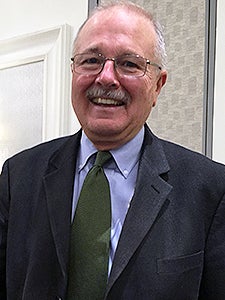Spread the Word
Edward Finegan, professor emeritus of linguistics and law, recently spoke with a medical doctor who teaches at the University of Georgia. In the course of their discussion, Finegan brought up the word “agender,” meaning a person who doesn’t identify as being either male or female.
“She said, ‘That’s just the kind of word we need in the medical profession,’ ” said Finegan, who still serves as director of the USC Center for Excellence in Teaching. “She told me that if doctors were able to choose any word about gender to add to the English language, that might be it.”
Last week, Finegan’s friend got her wish. Both “agender” and “bigender” were added to dictionary.com’s database — along with such other neologisms as “lifehack” and “microaggression,” and a number of lexicographical mainstays that have taken on new meanings.
Finegan, a member of the Dictionary Society of North America and the editor of the society’s journal, believes that language must evolve based on circumstance. Adding new terms keeps communication effective.
While standard print dictionaries, such as Merriam-Webster’s Collegiate, Random House and the Oxford English Dictionary tend to be more conservative, he said, purely online dictionaries have unlimited space and therefore more opportunity for growth. Because they compete for users, they also benefit from announcing new words.
“What you see with dictionary.com and this new list of words is a way of garnering attention by indicating how up-to-date they are,” he said.

Edward Finegan is a professor of linguistics and law, as well as a member of the Dictionary Society of North America and editor of its journal. Photo courtesy of Edward Finegan.
As a scholar, Finegan believes that the addition of particular words to the English lexicon may prove to have powerful implications for society.
Clever or snarky words such as “slacktivism” — meaning “actions taken to bring about political or social change but requiring only minimal commitment, effort or risk” — may very well open people’s eyes to the fact that signing an online petition to oppose dolphin fishing probably does very little to protect dolphins.
“Legitimizing a word like this almost shames people into realizing what they are actually doing,” he said. “And giving words power like this is a wonderful thing.”
On a more profound level, accepting words such as “bigender” calls people’s attention to the fact that some people may identify as both male and female. “It gives it an identity, a name,” Finegan said.
Finegan, who also serves as president of the International Association of Forensic Linguists, recently consulted on a case in which a student who had been accepted into a California nursing school was thrown out on the grounds that she had misrepresented herself on her application. The student had indicated her “gender” as female, although she had been born male.
Though the court ruled that the private university had the right to ask the student to leave, the school later changed its application to ask candidates’ ‘sex’ rather than ‘gender’ to avoid the situation in the future.
“The evolution of social constructions often begins in language,” Finegan said. “In my report for the case, I went to online dictionaries — especially those with features that ask why people look up certain words — and learned that many students were searching for the difference between ‘sex’ and ‘gender.’ They were confused. It is important that our vocabularies keep up with these social changes.”
While Finegan identifies as a linguistic liberal, there are areas in which he just won’t compromise.
“If I see ‘irregardless’ written in a student’s paper, I will still cross out the ‘ir,’ ” he noted. “There is a difference between embracing what’s new — and what is simply unacceptable standard English.”